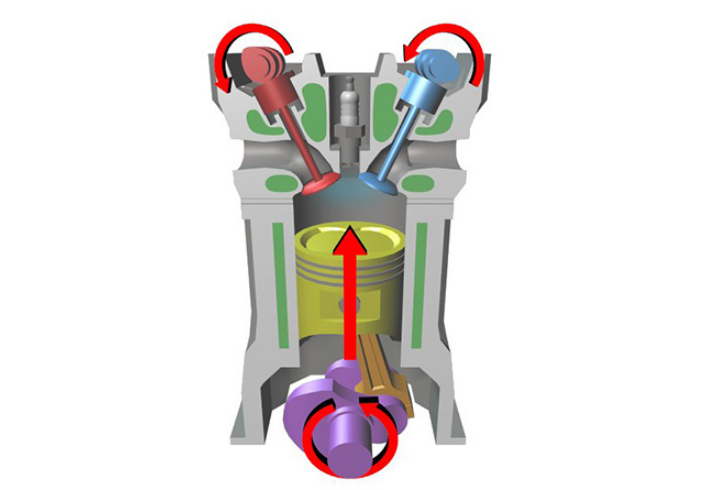What is a piston and how does it work?
The internal combustion engine in your car may seem complex, with numerous components contributing to the engine's operation and combustion process. Among these components is the engine piston. Your car's engine typically houses between four and twelve pistons, each situated within its respective engine cylinder. The movement of these pistons is integral to the engine's function, and ensuring they operate correctly is essential for car maintenance. Let's explore what an engine piston is, its function, common issues that may arise, and methods for prevention and resolution.
What is a piston and how does it work?
A piston is a piece of metal located inside of each cylinder in your engine that moves up and down to allow the engine to run. As the air-fuel mixture, which powers the engine, enters through the fuel injection system, the downward movement of the piston compresses it, initiating the internal combustion reaction within the engine. This combustion reaction propels the pistons back upward, and the resulting force is transferred from the pistons to the crankshaft via a connecting rod. Consequently, the combustion force rotates the crankshaft, enabling the transmission to receive engine power and distribute it among the car’s wheels.
In essence, the pistons kickstart the fuel combustion process and mark the beginning of the engine power transfer chain. This process begins with the pistons and concludes with power reaching the wheels. Without the pistons, there would be no mechanism to harness engine power from the combustion reaction, rendering it impossible for engine power to reach the wheels.
Common Piston Problems
While engine pistons are generally durable and do not demand extensive routine maintenance, issues may arise that impact overall engine performance, particularly in older engines. Here are some of the most prevalent problems that can occur with your engine pistons.
"Piston Slap"
"Piston slap" refers to the noise produced by worn-out pistons. As pistons wear down, the gap between the piston and the cylinder it operates within increases. When this gap becomes too large, the resulting excess space causes the piston to generate noise, characterized by a distinct "slapping" sound. This serves as an indication that your engine pistons require replacement.
Worn Piston Rings
Piston rings encircle the exterior of the piston and play a crucial role in dissipating heat from the piston by transferring it to the cooler cylinder wall. Additionally, they establish an airtight seal to prevent engine oil from seeping past the piston and entering the combustion chamber. Over time, piston rings may wear, resulting in a noticeable drop in engine oil level or the emission of white smoke from the exhaust tailpipe, indicating a compromised seal.
Featured content:Automobiles & Motorcycles
The Benefits of Upgrading Your Berlingo Front Spring
Upgrade Your Ride: 1955 Chevy Front Coil Springs Guide
How Does the 2025 White BYD e2 Perform?
How to Choose a Red BAIC MOTOR X10 PHEV Exporter?
Upgrade Your 1955 Chevy Front Coil Springs in 2024
2003 Dodge Ram 1500 Coil Springs: OEM vs. Aftermarket Options
Burnt Piston
Improper setup of car and engine components can result in the tops of your pistons being scorched. In severe cases, this can lead to the formation of holes in the pistons. Common causes include dirty fuel injectors or the installation of incorrect spark plugs. Burnt pistons significantly diminish engine power output.
Cracked Piston
Consistent use of low-quality gasoline can cause pistons to develop cracks, potentially impairing the vehicle's ability to function. Cracked pistons may also indicate larger vehicle issues, such as a malfunction in the exhaust gas recirculation (EGR) system.
Piston Maintenance and Repair
Piston repair is a labor-intensive and costly process, involving disassembling and reassembling the engine once the repair or replacement is completed. To avoid piston-related issues, proactive maintenance of your vehicle, particularly the engine, is crucial.
One of the most essential aspects of engine maintenance is regular oil and filter changes. Typically, oil changes should be performed every 5,000 to 7,500 miles for most cars. However, refer to your manufacturer’s recommendations in your owner’s manual for the precise interval for changing engine oil and filters. This practice prevents engine overheating, thus mitigating the majority of potential piston problems.
Similarly, ensuring proper antifreeze coolant levels is essential for preventing overheating. Regularly check your coolant level and replenish it when low. Schedule a coolant flush if you observe discolored or dirty coolant.
Additionally, maintaining spark plugs can help prevent piston cracking. Spark plugs should be replaced approximately every 60,000 miles. Ensure that the correct type of spark plugs is installed for your car, and seek assistance from a car care professional for optimal guidance.
Featured content:How to Choose the Perfect HYUNDAI Coil Spring for Your Vehicle?
How to Replace 2010 VW Jetta Rear Coil Spring
VOYAH Chasing Light vs Traditional EV Services: A Detailed Comparison
2001 BMW 325i Rear Coil Springs: OEM vs Aftermarket Options
How to Choose 8.5x
How to Choose 55 Chevy Front Coil Springs?
Are Astra H Coil Springs Causing Your Suspension Problems?
- Previous: How Do Automation Equipment Precision Parts Enhance Efficiency?
- Next: None
- 0










